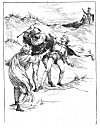 Click to enlarge Drew by the haire along upon the grownd A handsom stripling with great crueltee, Whom sore be bett.'' |
As Sir Guyon and his guide, the Black Palmer, went on their way, they presently saw at some distance what seemed to be a great uproar and commotion. Hurrying near, they found a big savage man dragging along and beating a handsome youth. An ugly old woman followed them, shouting and railing, and urging the man not to let go the youth, but to treat him worse and worse.
The name of the bad man was Fury; the old woman was his mother, and was called Occasion. The youth was a young squire, named Phaon.
Fury had Phaon completely in his power, but in his blind and senseless rage he scarcely knew what he was about, and spent half his force in vain. He often struck wide of the mark, and frequently hurt himself unawares, like a bull rushing at random, not knowing where he hits and not caring whom he hurts.
When Sir Guyon saw the sad plight of the young squire, he ran to help him; but Fury grappled with the Knight and flung him to the ground. Sir Guyon sprang to his feet, and drew his sword, but, seeing this,
 Click to enlarge Drew by the haire along upon the grownd A handsom stripling with great crueltee, Whom sore be bett.'' |
the Palmer cried, "Not so, O Guyon; never think the monster can be mastered or destroyed in that fashion. He is not a foe to be wounded by steel or overthrown by strength. This cruel wretch is Fury, who works much woe and shame to knighthood. That old hag, his mother, is the cause of all his wrath and spite. Whoever will conquer Fury, must first get hold of Occasion and master her. When she is got rid of, or strongly withstood, Fury himself is easily managed. But she is very difficult to catch, for her hair hangs so thickly over her eyes, it is often impossible to know her, and when she has once slipped past, you can never overtake her."
When Sir Guyon heard this, he left Fury and went to catch Occasion. All happened as the Palmer said. Directly the wicked old woman was captured, and her angry tongue silenced, her son turned to fly. Sir Guyon followed, and soon made him prisoner; but even when bound in iron chains, Fury kept grinding and gnashing his teeth, shaking his copper-coloured locks, and threatening revenge.
Then Sir Guyon turned to the young squire, and asked him how he had fallen into the power of such a wretch.
Phaon said all his misfortunes arose from his giving way to wrath and jealousy. He had a dear friend, about whom malicious stories were told, and without waiting to find out whether or not they were true, he killed this friend in sudden anger. When he discovered that he had been misled, and that his friend was innocent, he was filled with grief, and swore to be revenged on the two people who had deceived him. To one he gave
a deadly draught of poison, and the other he was pursuing with a drawn sword, when' he himself was overtaken by Fury, who completely mastered him.
"As long as I live," he ended, "I shall never get over the agony caused me by Grief and Fury."
"Squire," said Sir Guyon, "you have suffered much, but all your ills may be softened if you do not give way to such violence."
Then said the Palmer, "Wretched is the man who never learns to govern his passions. At first they. are feeble and can be easily managed, but through lack of control they lead to fearful results. Fight against them while they are young, for when they get strong they do their best to overcome all the good in you. Ungoverned wrath, jealousy, and grief have, been the cause of this squire's downfall."
"Unlucky Phaon," said Sir Guyon; "since you have fallen into trouble through your hot, impatient disposition, henceforth take heed, and govern your ways carefully, less a worse evil come upon you."
While Sir Guyon spoke, they saw far off a man running towards them, whose flying feet went so fast that he was almost hidden in a cloud of dust.